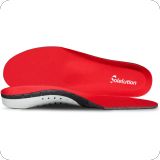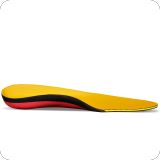Over Pronation Insoles
Looking for over pronation insoles? If so, then Podobrace is your best choice. The insoles shown below will offer you support for anti pronation. Prefer additional information? Feel free to read on, we're happy to explain it to you.
Read more »
About over pronation:
Everyone walks in a different way. This is why pretty much everyone will need a different type of (sports)insole for their feet. Over pronation is the degree to which the foot rolls in or out when walking or running. Some people their feet roll inwards (over pronation) and other people their feet roll outwards (under pronation). Pronation isn't a serious problem, but in order to prevent more serious injuries and complaints from occurring, it is very important that you choose the right anti pronation insoles that suit your specific situation. Below you will find the 3 best-selling insoles and some explanation.
Underpronation:
Under pronation isn't that common. The outside of the heel is heavily pressured during the coming down of the foot, which causes the shock of coming down to be transferred to the lower leg. During the entire running phase, this type of runner keeps walking on the outside of its feet and will also push away with the outside of their feet. The best under pronation insoles at the moment are the MySole Anatomical - Underpronation Insoles.
Neutral pronation:
Around 80% of all runners have neutral pronation. People with a neutral running style land on the center of the outside of the heel, then roll towards the center of the forefoot to eventually push away with the center of the forefoot. In the gait of the foot, the sole closes mainly on the middle/outside of the heel and the middle of the forefoot. The best neutral pronation insoles are the Solelution Gel Insoles Max.
Overpronation:
Overpronation is when the foot rolls inwards at times when this shouldn't happen. Which means you land on the inside of your heel. As a result, a lot of weight is shifted to the inside of the foot, which means that the feet will have to deal with increased pressure when pushing away. Due to the overload on the inside, there's an increased risk of unpleasant injuries to the hips, knees, shin and back. You can see if you overpronate or not by looking at your shoes. If they show wear on the inside of the heel and under the ball of the foot and especially the big toe. The best overpronation insoles out right now are the Solelution Overpronation Insoles.










